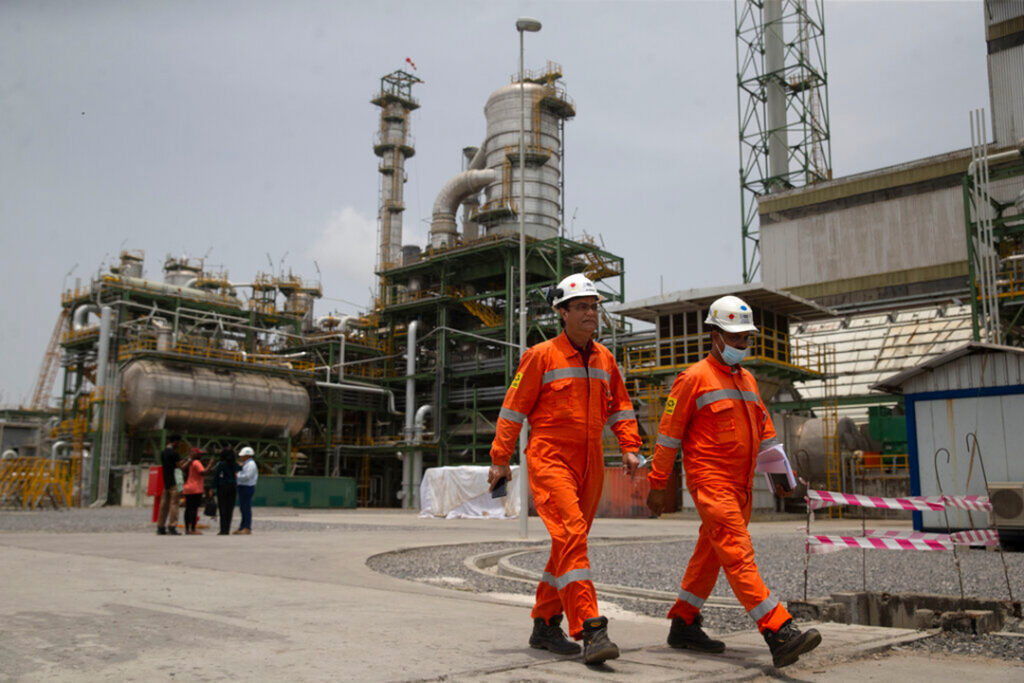ADF STAFF
Many Africans are closely following the news of Russia’s invasion of Ukraine on television or the radio, but they are also feeling its impact somewhere much closer to home: the market.
The ripple effect of Russia’s war continues to punish African economies, particularly in the fuel, wheat and fertilizer industries.
“Once they increase petrol prices, the cost involved in transporting the goods from the farm gates to the market centers also goes up,” plantain trader Mary Tiwaa told the Ghanaian newspaper The Daily Graphic in late March. “This affects the prices of the foodstuffs.”
International oil prices, a key indicator of the impact of Russian military aggression, already have surged past $100 per barrel, which was last seen in 2014. The benchmark price of Brent Crude oil traded at $130 per barrel March 8.
“The hardship is too much,” Tiwaa said, calling on her government to do something to stabilize food prices.
Gas producers such as Nigeria, Senegal and Tanzania eventually could benefit from a global shift away from Russian energy. But most Africans are feeling the squeeze now.
Ugandans already have seen a surge in prices of fuel, cooking oil, soap, salt and sugar.
In Kenya, where Russia and Ukraine supply nearly 90% of the country’s wheat imports, a 50-kilogram bag of fertilizer that cost $35 in Kenya last year was $57 in March and is likely increasing because the planting season has begun.
Some African countries are seeking alternative suppliers with an eye toward a more stable future of diverse supply chains.
South African Mineral Resources and Energy Minister Gwede Mantashe said conflict and other uncertainties in the “global supply and security of petroleum” must push Africa to own oil refinery infrastructure.
“Such capacity guarantees national security,” he said during the Africa Energy Indaba exhibition in March.
South Africa imports the bulk of its crude oil from African producers, including Nigeria and Angola, he said, noting that “there is ample opportunity for a massive expansion of gas trade, especially from the Gulf of Guinea and the broader West Coast of Africa, where we have many producers and some already exporting.”
Later this year, Nigerian businessman Aliko Dangote plans to open an oil refinery that can produce 650,000 barrels per day.
In another stroke of good timing, Dangote opened a 500-hectare, $2.5 billion urea and ammonia fertilizer plant outside Lagos on March 22. With an annual capacity of 3 million metric tons, it’s the second-largest urea factory in the world.
Russia is also an important producer of fertilizer, an aspect of African farming that will be a key factor in the continent’s food security.
Many farmers still plant without fertilizer, but their yields are, on average, 40% to 60% lower.
The urea market has “gone through the roof,” Dangote told the news network CNN on March 24.
“We are lucky to have this plant,” he said. “It is coming at the right time with the Ukraine-Russia conflict, as both Ukraine and Russia control substantial amounts of agricultural inputs.
“This can help a lot of African countries.”
There are other positive signs that African nations can develop supply chains to move the continent in the direction of self-sufficiency.
- Ethiopia’s government says the country has doubled wheat yields over the last 15 years.
- There is renewed interest in establishing a trans-Saharan gas pipeline from Nigeria to Algeria, which would increase African gas exports and help the European Union diversify its gas supplies.
- After Russia, South Africa is the world’s second-biggest producer of palladium, a metal that is a critical input in electronics and automobiles. South Africa is expected to see demand rise because of sanctions on Russia.
Despite long-term hopes, the short-term challenges are daunting. Officials and analysts expect the long-term consequences of Russia’s invasion will be felt for years to come.
Maximo Torero, chief economist of the U.N.’s Food and Agriculture Organization, recently tweeted estimates that the invasion will drive up wheat prices by another 8.5%, “forcing poor people to eat less food, even as hunger and malnutrition rose sharply due to COVID-19.”
“We are in an extremely problematic situation whose trajectory remains uncertain,” he wrote. “Russia is a major energy supplier. Farming requires fuel, gas, electricity. Making fertilizers, pesticides, feedstuffs also require energy. Rising energy prices could lead global fertilizer prices to hike 13% in the next four years, reducing crop yields.”
Ngozi Okonjo-Iweala, director-general of the World Trade Organization, said it is monitoring the impact of Russia’s war on the sharp global price increases on energy, fertilizer, grain, oilseeds and vegetable oils.
During a virtual meeting March 21, she called for “reglobalization” — addressing global supply-chain chokepoints by bringing more countries into international production networks.
“Deeper, more diversified international markets remain our best bet for supply resilience,” she said.

